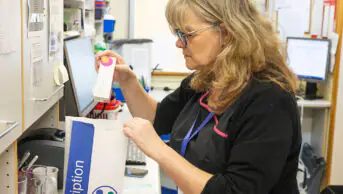
Alamy Stock Photo
Health boards across Wales have begun to roll out a sore throat test-and-treat (STTT) service to more community pharmacies following a successful pilot, which began in 2018.
The on-the-spot throat swab scheme — which aims to diagnose whether an illness is viral or bacterial and aid decisions about whether antibiotics are appropriate — was initially launched in selected pharmacies in the Cwm Taf Morgannwg University and Betsi Cadwaladr University health board areas in autumn 2018. The service was launched as part of NHS Wales’ ‘Choose Pharmacy’ service and will now be expanded to cover all seven health boards.
A spokesperson from the Welsh government told The Pharmaceutical Journal that, following an evaluation of the service, a phased implementation began in October 2019 for the STTT to be expanded and delivered in more community pharmacies across Wales. Currently, 58 community pharmacies are providing the service.
Numbers for the final size of the expanded scheme have not been given, but Vaughan Gething, the Welsh health minister, has previously said that he hoped half the pharmacies in Wales would be providing the service this winter.
The National Institute for Health and Care Excellence (NICE) issued guidance in October 2019, which did not recommend rapid tests for group A streptococcal infections as routine adoption for people with a sore throat.
However, NICE also found no evidence on the diagnostics or clinical utility of rapid test accuracy when used in community pharmacies, meaning it was not possible to assess the cost-effectiveness of the test in a pharmacy setting.
“In light of NICE’s recent guidance, which was unable to make any assessment of the cost effectiveness of the use of sore throat point-of-care tests in community pharmacies, we will continue to evaluate the benefits of the service as it expands,” the spokesperson for the Welsh government said, adding that an initial evaluation of 3,655 consultations, provided through the STTT, indicated antibiotics were supplied in just 21% of consultations.
“Small reductions in antibiotic prescribing [were] observed in the pilot areas when compared to areas in which the service was not available,” they said.
“We are confident the service did not result in increased antibiotic consumption.”
Cwm Taf Morgannwg University Health Board was part of the ‘Choose Pharmacy STTT’ pathfinder project and evaluation study, and a spokesperson for the board said the study had demonstrated that the service had potential for rebalancing management of uncomplicated sore throats within primary care; through safe treatment and advice; reduced antimicrobial use; and high-end user acceptability with good patient and pharmacist experience feedback.
Data gathered between November 2018 and January 2019 for the services in both of the pilot health board areas, showed that almost 94% of patients seen would have sought an appointment with a GP had the service not been available. Around 80% of patients did not receive a supply of antibiotics and almost all patients who provided feedback on the service said that they would return to the pharmacy instead to trying to see a GP next time they had a sore throat.


